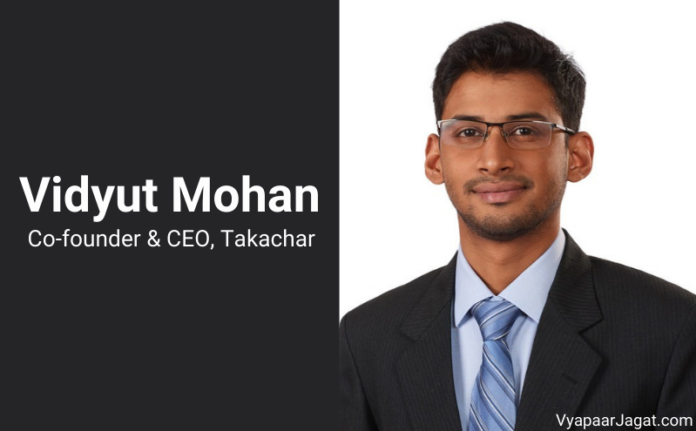At the 2021 United Nations Climate Change Conference, Glasgow, Prime Minister Narendra Modi kept aside his precious two minutes to meet an engineering graduate from New Delhi. This 30-year-old youth is rightly called the Messiah of Climate Protection, and his innovations are looked at as a game-changer for air pollution.
Meet Vidyut Mohan, whose portable and the cost-effective machine is being looked at as the game-changer in humanity’s fight against air pollution. Interestingly, his ill-health due to New Delhi’s toxic air made him invent this machine.
Takachar
He became a household name across the globe after his Takachar: Harvesting value from agricultural waste was selected for the Young Championship of the Earth, Asia, and the Pacific. This award was conferred by the United Nations Environment Programme- UNEP.
Takachar is a company developed by Vidyut Mohan. This company is using a novel technology called oxygen-lean torrefaction. The company through research and development has invented small-scale, low-cost, portable equipment to convert waste biomass into solid fuel, fertilizer, and other specialty chemicals. This machine helps the farmers to process the farm wastes locally instead of sending waste biomass to centralized conversion facilities. According to Vidyuth Mohan, Takachar’s system is more profitable as it reduces the logistics cost of hauling loose, wet, and bulky biomass drastically. It also increases the net income of rural communities by 40% by creating a market for crop residues.
His company Takachar’s goal is to increase the amount of waste biomass (post-harvest crop/forest residues) transformed into marketable products around the globe. Through this, he wants to reduce the pollution associated with open-air biomass burning, which is a common practice across India today. By choosing activated carbon (AC) as the starting market, Takachar brings this value chain to the doorstep of farmers and hence reduces air pollution associated with crop residue burning, while ensuring a stable, renewable, pollution-free, and financially lucrative raw material supply for the AC industry vs. traditional fossil-based sources. He has set the target of helping the 300 million farmers by 2030. He has set a goal of creating $4 billion/year equivalent in additional rural income and jobs, and mitigating one gigaton/year of CO2 equivalent, which is one of the major challenges faced by the world today.
Early Life
Born in New Delhi, Vidyut Mohan pursued his initial education at the Sardar Patel Vidyalaya. He selected Physics, Chemistry, Maths, and Economics in his early education. He had leadership qualities since his very childhood days and he held several positions at the school levels including a member of the student council, assistant secretary sports (9th Grade). And secretary program implementation when he was studying at the +2 level. But he was awarded an All-Rounder Scholarship for his extraordinary talent and contribution.
After the +2, he joined the prestigious RV engineering college in Bengaluru, Karnataka for his engineering education in the year 2009. He chose mechanical engineering as his subject and secured BE degree with a CGPA of 9.10/10, first class with distinction from this autonomous institute; As an engineering student, he was actively involved in a number of activities. He is the founding team member of SAE India’s electric rickshaw. It is important to note that today our country is witnessing the e-auto revolution. He is also the founding team member of the Avvenntura-adventure club of RVCE. Besides this, he was also the organizer of ‘Race it’- RC car design and racing competition.
It is worth mentioning that even as a student, Vidyut Mohan aspired to find a solution to the problems faced by the farmers of the country. One of the major issues faced by the Indian farmers is the water crisis. Hence, in his final semester thesis project in mechanical engineering, his team designed a software tool to estimate the crop water requirements and solar pump system optimization based on the nature of the crop, area of land, and climatic conditions.
After his graduation, he moved to Technische Universiteit Delft. As he was interested in pursuing higher studies in sustainable development, he selected a Master’s degree in the field of study of Sustainable Energy Technology and Sustainable Entrepreneurship. He secured his degree with a grade of 8.2/10. He graduated with Honours, J.N. Tata Scholar. At the time of his studies, he was the student assistant: Delft Global Initiative, Volunteer- I Love Wind Power. Curiously, his master thesis focused on designing and applying small-scale thermo-chemical equipment that upgrades waste biomass to fuels, fertilizers, and speciality chemicals.
Along with engineering and science education, he also pursued a music course for five years at Gandharva Mahavidyalaya, New Delhi. He pursued Madhyama Purna in music and also pursued five years of certified learning in Tabla. Besides all these, he pursued 22 other different courses. All these courses were related to renewable energy, water conservation, environment protection, etc.
Other achievements
Furthermore, he had earlier worked with Simpa Networks, where he developed Pay-as-you-go solar home systems for rural households in the country. He was also the winner of the 2019 Echoing Green Fellow. He was also Forbes 30 Under 30 awardee in the year 2020. Other awards conferred to him include Dutch Royal Society of Engineers grant for master thesis on biomass Torrefaction in Rural India, ‘Students for Sustainability grant for master thesis on biomass Torrefaction in rural India TU Delft University Funds Grant for master thesis on biomass Torrefaction in India, JN Tata Scholarship for the higher education of Indians Highest in Social Science Scholarship for outstanding performance in Sanskrit language examination, and 10th grade All Rounders Scholarship- Boys.
Work in a remote village:
One may not believe it, but this is true. This New Delhi lad visited Ujire, a remote town in Dakshina Kannada district for three months in 2012 (between June and August) to help the communities as part of the SELCO Foundation initiative. He worked on a project called service system design of biogas energy services to households and businesses in rural Karnataka. As part of this project, he carried out extensive field interviews to study possible stakeholders such as households, restaurants, universities, etc. He designed different service systems and business models based on needs assessment studies. He carried out research on the last mile gaps in biogas projects in the present and in the past in India.






